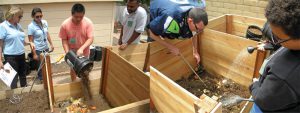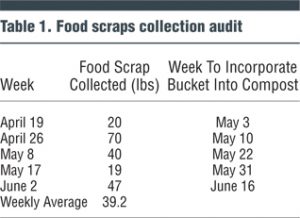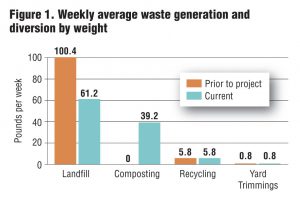The McNealy House in Oceanside, California, a home for individuals with autism and other developmental disabilities, established an on-site fermentation and composting program.
Jessica Toth and Erika Osorio
BioCycle October 2016

TERI clients add mulch to the compost bin (left) and check the moisture in the mix to ensure enough water is added (right).Teri’s McNealy House is a residential home for six men in Oceanside, California for individuals with autism and other developmental disabilities. With generous financial support from the City of Oceanside, TERI, and the Oceanside Charitable Foundation, Solana Center for Environmental Innovation in Encinitas (CA) created a successful food scraps composting program that involves the residents and staff at McNealy House as well as day students from the Learning Academy. Implementation of the program was guided by the need to divert organics from disposal as well as offer garden-centered activities for TERI residents and other TERI students.
“In line with California’s 75 percent diversion goals, stricter organics recycling mandates and Oceanside’s own Zero Waste goals, a need for both centralized and decentralized composting options for businesses and residential communities will become paramount, and the McNealy House food scraps composting project serves as a model program that should be replicated in other residential living communities,” notes Colleen Foster, Senior Management Analyst, Solid Waste and Recycling, Water Utilities Department in the City of Oceanside.
Meals at McNealy House are prepared in the home’s kitchen. Residents help with preparation and cleanup. Working with TERI staff, Solana Center determined that combining the bokashi in-vessel fermentation technique with traditional composting would be the best solution for this setting. Bokashi preprocessing, which involves adding a fermentation starter to the food scraps, is done in sealed containers and does not need daily management. Meats, sauces, drinks and food-soiled paper products can be included in the feedstock stream.
Program Implementation
The program kicked off in early April 2016 with a training for TERI staff and Solana Center volunteers on bokashi fermentation and the composting process. TERI purchased eleven 5-gallon buckets with locking gamma lids to hold food scraps as well as all materials to build the custom three-bin compost system.
The first training session was held in mid-April. TERI residents and Learning Academy students were taught how to sort food waste and participated in Solana Center’s waste sorting game. “The program’s concepts were simple enough that most of the students were able to participate despite various levels of functionality,” explains Diane Hazard, Solana Center’s Director of Education.
Over the next several weeks, McNealy House residents collected food scraps in 5-gallon buckets, sprinkling in bokashi bran after each addition of food scraps to the buckets. Once a bucket is full, it must remain closed for at least two weeks to ferment.
About a month later, Solana Center held the second resident training to instruct residents and day clients about integrating the buckets of bokashi-treated food scraps into the composting system. Instruction and guidance were provided as participants added food scraps, mulch and water to the composting bin and used aerators to mix. Two dedicated Solana Center Master Composter volunteers manage the compost pile weekly and as needed.
Over five weeks (starting when the separation program began), a Solana Center educator weighed and recorded the food scraps collected in the 5-gallon bokashi buckets as part of a collection audit. The date each bucket’s contents could be incorporated into the compost pile was noted. The amount of material collected each week varied, depending on house activities during the week, such as when there were visitors or home leave (Table 1).
Outcomes
TERI staff from McNealy House and the Learning Academy were impressed with the composting program. They believe it will be beneficial for their clients’ development as well as provide opportunities for more interaction with the outdoors. One McNealy House resident in particular has a great affinity for the program and became the house “Composting Ambassador.” “We are looking forward to our continued partnership at this location and other TERI sites,” says William Mara, TERI Chief Operating Officer.
Solana Center’s assessment of the waste stream concluded that, on average, McNealy House generates 107 pounds of recyclables, trash, yard trimmings and food scraps each week. Through the composting program, 39 lbs/week of food scraps, on average, were diverted from the landfill (Figure 1), a 39 percent reduction, by weight. Annually, Solana Center estimates that McNealy House can divert over 2,000 lbs of food scraps from disposal. With the addition of composting, the people living at McNealy House (residents plus the house manager) are now diverting 43 percent of all of their waste, up from just 6 percent previously.
With significantly less waste for the grey trash bin, McNealy House may be able to contract for downsized waste hauling services (i.e., a smaller grey bin). Recycling rates are low, suggesting that training on recyclables would increase the overall diversion rate further. In the future, McNealy House may incorporate yard trimmings into the composting pile, further reducing hauling services and carbon footprint. Oceanside City staff members are looking to help the McNealy House increase its overall recycling opportunities.
“The City of Oceanside recognizes the TERI McNealy House as a leader for its innovative composting efforts, and looks forward to working with the home to expand opportunities for increased recycling, zero waste, and sustainability for the residents,” adds Foster.
Jessica Toth is Executive Director of Solana Center for Environmental Innovation in Encinitas, CA and Erika Osorio, also at Solana Center, is the lead educator on the McNealy House project.












